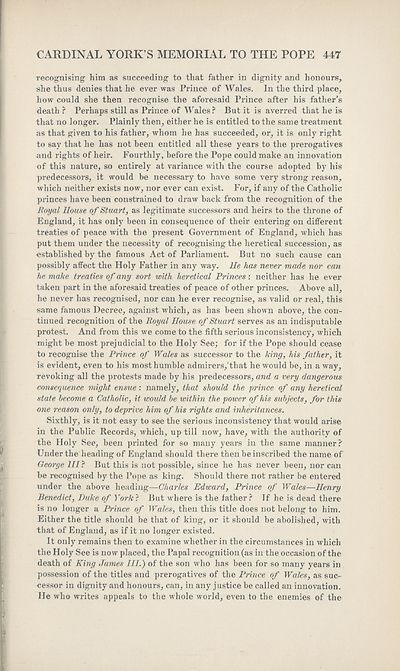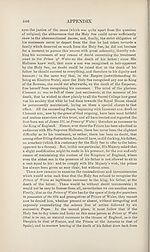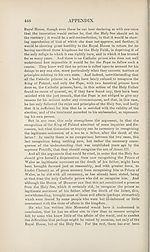Series 2 > Origins of the 'Forty-five
(544) Page 447
Download files
Complete book:
Individual page:
Thumbnail gallery: Grid view | List view

CARDINAL YORK’S MEMORIAL TO THE POPE 447
recognising him as succeeding to that father in dignity and honours,
she thus denies that he ever was Prince of Wales. In the third place,
how could she then recognise the aforesaid Prince after his father’s
death ? Perhaps still as Prince of Wales? But it is averred that he is
that no longer. Plainly then, either he is entitled to the same treatment
as that given to his father, whom he has succeeded, or, it is only right
to say that he has not been entitled all these years to the prerogatives
and rights of heir. Fourthly, before the Pope could make an innovation
of this nature, so entirely at variance with the course adopted by his
predecessors, it would be necessary to have some very strong reason,
which neither exists now, nor ever can exist. For, if any of the Catholic
princes have been constrained to draw back from the recognition of the
Royal House of Stuart, as legitimate successors and heirs to the throne of
England, it has only been in consequence of their entering on different
treaties of peace with the present Government of England, which has
put them under the necessity of recognising the heretical succession, as
established by the famous Act of Parliament. But no such cause can
possibly affect the Holy Father in any way. He has never made nor can
he make treaties of any sort with heretical Princes: neither has he ever
taken part in the aforesaid treaties of peace of other princes. Above all,
he never has recognised, nor can he ever recognise, as valid or real, this
same famous Decree, against which, as has been shown above, the con¬
tinued recognition of the Royal House of Stuart serves as an indisputable
protest. And from this we come to the fifth serious inconsistency, which
might be most prejudicial to the Holy See; for if the Pope should cease
to recognise the Prince of Wales as successor to the king, his father, it
is evident, even to his most humble admirers,’that he would be, in a way,
revoking all the protests made by his predecessors, and a very dangerous
consequence might ensue : namely, that should the prince of any heretical
state become a Catholic, it would be within the power of his subjects, for this
one reason only, to deprive him of his rights and inheritances.
Sixthly, is it not easy to see the serious inconsistency that would arise
in the Public Records, which, up till now, have, with the authority of
the Holy See, been printed for so many years in the same manner?
Under the heading of England should there then be inscribed the name of
George HI? But this is not possible, since he has never been, nor can
be recognised by the Pope as king. Should there not rather be entered
under the above heading—Charles Edward, Prince of Wales—Henry
Benedict, Duke of York? But where is the father? If he is dead there
is no longer a Prince of Wales, then this title does not belong to him.
Either the title should be that of king, or it should be abolished, with
that of England, as if it no longer existed.
It only remains then to examine whether in the circumstances in which
the Holy See is now placed, the Papal recognition (as in the occasion of the
death of King James III.) of the son who has been for so many years in
possession of the titles and prerogatives of the Prince of Wales, as suc¬
cessor in dignity and honours, can, in any justice be called an innovation.
He who writes appeals to the whole world, even to the enemies of the
recognising him as succeeding to that father in dignity and honours,
she thus denies that he ever was Prince of Wales. In the third place,
how could she then recognise the aforesaid Prince after his father’s
death ? Perhaps still as Prince of Wales? But it is averred that he is
that no longer. Plainly then, either he is entitled to the same treatment
as that given to his father, whom he has succeeded, or, it is only right
to say that he has not been entitled all these years to the prerogatives
and rights of heir. Fourthly, before the Pope could make an innovation
of this nature, so entirely at variance with the course adopted by his
predecessors, it would be necessary to have some very strong reason,
which neither exists now, nor ever can exist. For, if any of the Catholic
princes have been constrained to draw back from the recognition of the
Royal House of Stuart, as legitimate successors and heirs to the throne of
England, it has only been in consequence of their entering on different
treaties of peace with the present Government of England, which has
put them under the necessity of recognising the heretical succession, as
established by the famous Act of Parliament. But no such cause can
possibly affect the Holy Father in any way. He has never made nor can
he make treaties of any sort with heretical Princes: neither has he ever
taken part in the aforesaid treaties of peace of other princes. Above all,
he never has recognised, nor can he ever recognise, as valid or real, this
same famous Decree, against which, as has been shown above, the con¬
tinued recognition of the Royal House of Stuart serves as an indisputable
protest. And from this we come to the fifth serious inconsistency, which
might be most prejudicial to the Holy See; for if the Pope should cease
to recognise the Prince of Wales as successor to the king, his father, it
is evident, even to his most humble admirers,’that he would be, in a way,
revoking all the protests made by his predecessors, and a very dangerous
consequence might ensue : namely, that should the prince of any heretical
state become a Catholic, it would be within the power of his subjects, for this
one reason only, to deprive him of his rights and inheritances.
Sixthly, is it not easy to see the serious inconsistency that would arise
in the Public Records, which, up till now, have, with the authority of
the Holy See, been printed for so many years in the same manner?
Under the heading of England should there then be inscribed the name of
George HI? But this is not possible, since he has never been, nor can
be recognised by the Pope as king. Should there not rather be entered
under the above heading—Charles Edward, Prince of Wales—Henry
Benedict, Duke of York? But where is the father? If he is dead there
is no longer a Prince of Wales, then this title does not belong to him.
Either the title should be that of king, or it should be abolished, with
that of England, as if it no longer existed.
It only remains then to examine whether in the circumstances in which
the Holy See is now placed, the Papal recognition (as in the occasion of the
death of King James III.) of the son who has been for so many years in
possession of the titles and prerogatives of the Prince of Wales, as suc¬
cessor in dignity and honours, can, in any justice be called an innovation.
He who writes appeals to the whole world, even to the enemies of the
Set display mode to:
![]() Universal Viewer |
Universal Viewer | ![]() Mirador |
Large image | Transcription
Mirador |
Large image | Transcription
Images and transcriptions on this page, including medium image downloads, may be used under the Creative Commons Attribution 4.0 International Licence unless otherwise stated. ![]()
| Scottish History Society volumes > Series 2 > Origins of the 'Forty-five > (544) Page 447 |
|---|
| Permanent URL | https://digital.nls.uk/126865719 |
|---|
| Attribution and copyright: |
|
|---|
| Description | Over 180 volumes, published by the Scottish History Society, containing original sources on Scotland's history and people. With a wide range of subjects, the books collectively cover all periods from the 12th to 20th centuries, and reflect changing trends in Scottish history. Sources are accompanied by scholarly interpretation, references and bibliographies. Volumes are usually published annually, and more digitised volumes will be added as they become available. |
|---|


